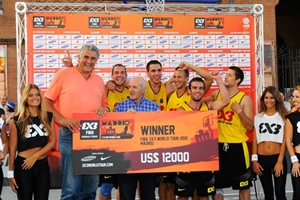
PARALYMPICS - Men’s Finals: Canadian clubs Australia; The American Revolution, Part II
LONDON (Paralympics) – After Patrick Anderson’s dominating performance not only in the Gold Medal Game but across the entire tournament, the only thing left to be decided is whether the country will be renamed Panada or Canderson.
With 34 points, 10 rebounds and 8 assists, playing all 40 minutes, defending gold medalists Australia had no answer to Anderson as Canada took the lead on the first basket of the third quarter and never gave it back in a 64-58 win.
It was the greatest individual performance in the Final since Australia’s Troy Sachs, calling this game for television, scored 42 points in the 1996 Gold Medal Game in Atlanta.
It’s been a phenomenal run for Canada who won their first medal, a gold one, in 2000 and quickly followed that with another in Athens and then silver in Beijing. Without a true team, there’s no way that would have happened, otherwise the Cleveland Cavaliers would have been NBA champions.
“Ever since Pat came into our program in 1997, we knew we had something special there and we bought into the system, we bought into the philosophy,” said Canadian big man Joey Johnson, who first played on the 1996 Paralympic team.
“We care about winning. If Pat had to score 40 points a game for us to be successful, we’ll do everything in our power to help him do that. If he scores five points a game and we’re successful, Pat will buy into that.”
The teams played even for the first half with Brad Ness, Shaun Norris and Justin Eveson handling the load for Australia while Anderson scored 15 of his team’s 26 points.
As the Aussies worked to limit him in the second stanza, Richard Peter scored all 10 of his points and David Eng, 6 points, made them pay.
The lead would get as high as nine but Tristan Knowles' three-pointer with 12 seconds to play kept Canadian nerves on edge until the buzzer finally sounded.
After all the celebration, the medal ceremony, talking to friends and family, Anderson was reflective on the accomplishment. “It feels sweet. It feels like the first medal I’ve ever won. I’m very satisfied and very proud of the guys.”
Rest assured Pat, the feeling is mutual.
In the Bronze Medal Game, the USA beat Great Britain 61-46. Steve Serio celebrated his 25th birthday with 20 points to lead the American wheelchair version of the redeem team to a 15-point win over Great Britain.
It had been 12 years since Sydney and the last time the USA bowed their heads to receive a medal and the hunger for that has been palpable. Coincidentally, or perhaps not as they’ve become regular dance partners in this pas de deux, the rivals were once again the Brits. That’s who they had last beaten for hardware albeit this time was in far less dramatic fashion than Paul Schulte’s clock-beating three-pointer from another time zone at the Sydney Superdome. Adding to the backstory is that Team GB had taken the bronze from the Americans in Beijing.
It was also a birthday present for USA coach Jim Glatch who admitted before the tournament that his future as coach depended on a result. Whether bronze is good enough will be determined.
Determined is what the American team was. Josh Turek, whose consistency has equaled Serio in this tournament, knocked in 15 points with Matt Scott and Joe Chambers adding 12 each.
In front of 12,627 fans cheering for the hosts, both teams started slowly but the USA took charge early, leading by seven after one quarter and nine at the half. Scoring nine straight points to open the second half, GB drew even led by Terry Bywater who would finish with 14 on the night. By the end of the third the lead was back up to six and the fourth quarter was all USA, the lead peaking at 19.
“The last two Paralympics we came home with nothing and that’s a pretty empty feeling,” said Scott. “It may not be the shiniest of medals but it’s something to be proud of.”
Winning their final game of the Paralympics had not happened in a while. Now that they’ve broken the medal hex, next time is about changing the color.
FIBA
















